There is a wide variety of common transparent roofing materials available, each with its own advantages and disadvantages, making them suitable for different scenarios and budgets. Below are the mainstream options with detailed introductions.
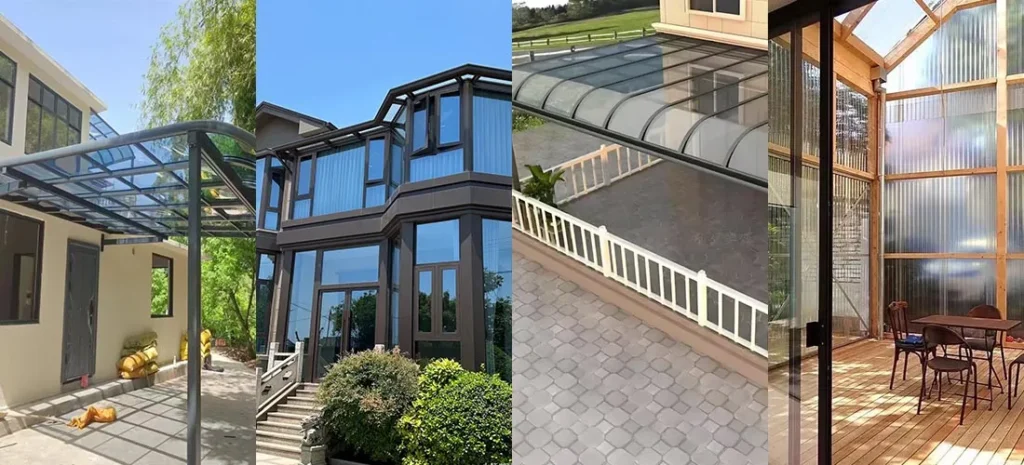
I. Overview and Comparison of Mainstream Transparent Roofing Materials
| Material Name | Advantages | Disadvantages | Common Applications |
|---|---|---|---|
| Tempered Glass | Excellent transparency, high hardness, good weather resistance, long lifespan | Heavy weight, risk of spontaneous breakage, poor thermal insulation | Sunroom roofs, atriums, large commercial courtyards |
| Polycarbonate Sheet (PC Sheet) | High impact resistance (bulletproof), lightweight, good thermal insulation, easily curved | Surface prone to scratching, average chemical resistance, can yellow with age | Patio covers, carports, greenhouses, sports venues |
| Acrylic Sheet (PMMA) | Transparency close to glass, good weather resistance, anti-aging, good processability | Relatively expensive, prone to scratching, flammable | Skylight domes, advertising lightboxes, aquariums, canopies |
| PVC Sheet | Inexpensive, lightweight, flexible and easy to install | Prone to yellowing and aging, poor durability, can expand and warp | Temporary structures, simple sheds, greenhouses (short-term use) |
| ETFE Membrane | Extremely lightweight, adjustable light transmission, self-cleaning, recyclable & eco-friendly | Very expensive, requires professional air pressurization system maintenance | Large stadiums (Water Cube), airport terminals, eco-domes |
II. Detailed Introduction of Each Material
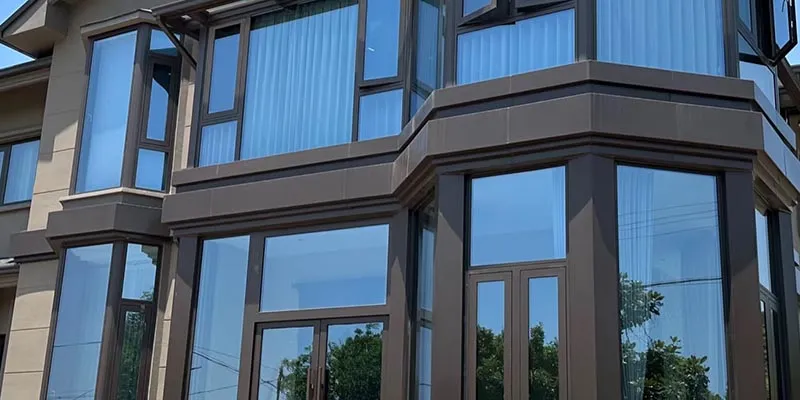
1. Tempered Glass
This is the most traditional option and offers the best transparency.
- Types: Typically, Laminated Tempered Glass (two layers of tempered glass with a PVB interlayer) is used. Even if it breaks, the fragments adhere to the interlayer, preventing injury from falling shards, making it very safe. For better thermal insulation and solar shading, Laminated Insulated Glass (with an air gap) is chosen.
- Characteristics:
- High Light Transmission: Provides unparalleled transparent views.
- High Safety: 3-5 times stronger than annealed glass; shatters into small, blunt granules.
- Durable & Weather Resistant: Stable under UV light, resistant to yellowing, lifespan of decades.
- Considerations: It is very heavy, requiring strong support structures. It has poor thermal insulation; direct use can cause extreme heat in summer. Using insulated Low-E glass is recommended to improve this.
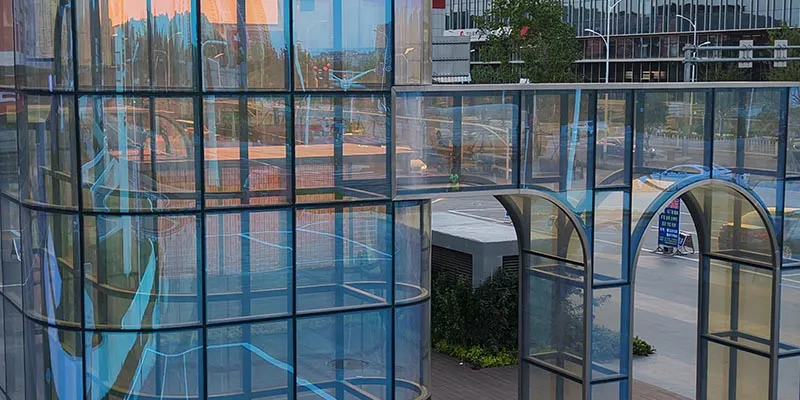
2. Polycarbonate Sheet (PC Sheet)
This is currently the most mainstream choice for residential and commercial markets due to its cost-effectiveness.
- Types: Mainly Solid PC Sheet, Corrugated Polycarbonate Sheet and Multiwall Polycarbonate Sheet (hollow with ribs). Multiwall sheets are widely used for their lightness and excellent thermal and acoustic insulation.
- Characteristics:
- Superior Impact Resistance: Over 200 times stronger than glass and 30 times stronger than acrylic, earning it the nickname “unbreakable glass.”
- Lightweight: About half the weight of glass, significantly reducing the load on structures.
- Excellent Thermal Insulation: The hollow structure effectively blocks heat transfer, improving energy efficiency.
- Cold Curving: Can be cold-bent, suitable for arched or wave-shaped roofs.
- Considerations: The surface is prone to scratching. High-quality PC sheets come with a UV-resistant coating on one side to prevent degradation and a hard coat on the other to prevent scratching. Always choose sheets with a dual-purpose or dual-layer coating.
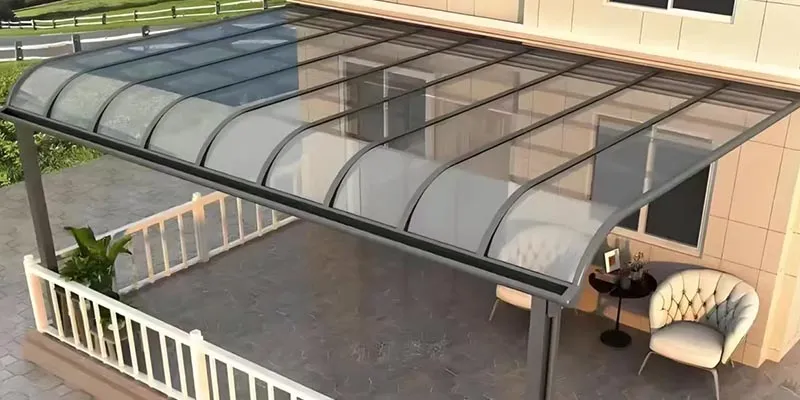
3. Acrylic Sheet (PMMA / Plexiglass)
An excellent alternative for high transparency, clearer than PC sheets.
- Characteristics:
- Very High Light Transmission: Over 92%, rivaling glass, with softer light diffusion.
- Excellent Weather Resistance: Highly resistant to UV light, less prone to yellowing or becoming brittle outdoors over time.
- Good Processability: Easy to cut, drill, and thermoform.
- Considerations: More brittle than PC sheet, with lower impact resistance. Generally more expensive than PC sheet. It is flammable.
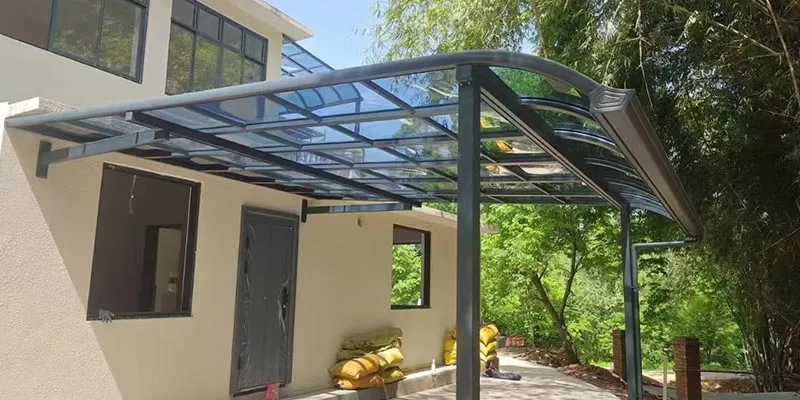
4. PVC Sheet
A low-cost option but with significant performance drawbacks.
- Characteristics:
- Low Cost: One of the cheapest transparent materials.
- Flexible & Easy to Install: Soft texture, can be rolled for transport and installation.
- Considerations: Poor durability; can quickly degrade, yellow, and become brittle under sun and rain. Prone to thermal expansion and contraction, leading to warping. Generally not recommended for permanent structures; more suitable for temporary or low-aesthetic applications.
5. ETFE Membrane
A representative of high-tech materials, used in large landmark buildings.
- Characteristics:
- Extremely Lightweight: Just 1% the weight of glass, placing minimal demand on support structures.
- Self-Cleaning: The very smooth surface allows dust and dirt to be washed away by rain.
- Design Flexibility: Often used as inflated cushions (multiple layers). Air pressure can be controlled to adjust insulation, and patterns can be printed to control shading and aesthetics.
- Long Lifespan: Resistant to chemical corrosion, with a service life of over 25 years.
- Considerations: Extremely expensive. Requires a complex system of air pumps and controls to maintain pressure, resulting in very high design and installation barriers.
III. Selection Advice
- For ultimate transparency and premium feel, with ample budget: Choose Laminated Tempered Glass (preferably with Low-E coating) for sunrooms and atriums.
- For residential patios, carports, greenhouses, seeking cost-effectiveness and safety: Choose UV-coated Multiwall Polycarbonate Sheet. This is the most common and practical choice.
- For good clarity in less demanding environments: Consider Acrylic Sheet for canopies or light covers.
- For temporary or simple use: Consider PVC Sheet, but be prepared to replace it periodically.
- For large commercial or public buildings: Consider ETFE Membrane structures for creating stunning visual effects.
Translucent Roofing Panels: Smart Solution to Reduce Reliance on Artificial Lighting >>



